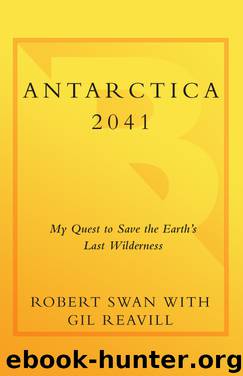Antarctica 2041 by Robert Swan

Author:Robert Swan [Swan, Robert]
Language: eng
Format: epub
ISBN: 978-0-307-58916-3
Publisher: Crown Publishing Group
Published: 2009-04-11T04:00:00+00:00
Icewalk
Fifteen minutes of fame is short. The media glare shone brightly upon In the Footsteps of Scott, illuminated us for a brief moment, then winked out.
But people remembered. The man in the street remembered. People came out by the dozens, by the hundreds, to hear me speak about our adventure. Francis Spufford, in his book I May Be Some Time: Ice and the English Imagination, explores my countrymen’s complex national obsession with the Arctic and Antarctic. On my speaking tour of the United Kingdom—which eventually expanded to Australia and elsewhere—I saw firsthand that the public fascination was still there.
I spoke primarily about In the Footsteps of Scott. Gradually though, in response to questions from the audience (“You must have hiked underneath that hole in the ozone layer, didn’t you?”), I began to talk more and more about the Antarctic environment.
In those days of the late 1980s, few people were seriously considering issues of climate change, but I was. I talked about how hydrocarbons emitted as a by-product of modern, industrial civilization had ravaged the poles. How chemical toxins inevitably migrated to the ends of the earth. How a precipitous rise in global temperature would put New York and London under water.
But I didn’t really believe any of it. I spoke about it merely because the environmental message seemed to go over well. If my audience had been obsessed with penguins, say, I would have featured them in my talks.
I knew I couldn’t very well stand up in front of people and say, “My name is Robert Swan, and I’d like you to help me pay off my debt.” That would have been closer to the truth of it. And that’s really what I was doing out on the lecture trail.
Looking back, I am somewhat ashamed. I was young and desperate. But this brand of bad faith—we call it “greenwashing” now—is the bane of the movement. I wasn’t thinking about Antarctica. I was thinking of myself.
Over the course of 1986–87, I traveled fifty thousand miles around the United Kingdom giving lectures. But chipping away at a mountain of debt with speaking engagements just wasn’t doing it.
At UNESCO headquarters in Paris, I met up with Jacques Cousteau. “We’ve been at this a long time, Sir Peter Scott and I and a few others,” he said. “It troubles you when you think no one’s listening.”
What I had to do, Cousteau told me, was develop short-term missions that the public could get behind. If every one of his ten dozen fabulous TV documentaries had been general—Save the Ocean!—then the viewership would have been be nil. So he did programs on the shark, on the dolphin, on the wonders of the sea. The long-term goal, that of protecting the ocean, was concealed inside Cousteau’s entertaining, short-term personal adventures aboard the Calypso.
Peter Scott told me much the same thing using different terms, when I visited him at his Slimbridge home in the United Kingdom. Divide the overall objective of preserving Antarctica, he said, into manageable projects that you can handle over the short run.
Download
This site does not store any files on its server. We only index and link to content provided by other sites. Please contact the content providers to delete copyright contents if any and email us, we'll remove relevant links or contents immediately.
Welcome to the Goddamn Ice Cube by Blair Braverman(2050)
Iced In by Chris Turney(2005)
Arctic Dreams by Barry Lopez(1771)
The White Darkness by David Grann(1722)
Mawson's Will by Lennard Bickel(1463)
Big Dead Place: Inside the Strange and Menacing World of Antarctica (Large Print 16pt) by Nicholas Johnson(1421)
Caroline Alexander by The Endurance: Shackleton's Legendary Antarctic Expedition(1403)
The Stowaway by Laurie Gwen Shapiro(1386)
South Pole by Elizabeth Leane(1305)
In the Kingdom of Ice by Hampton Sides(1288)
Tip of the Iceberg by Mark Adams(1275)
Ice! by Tristan Jones(1258)
Mummies and Pyramids by Mary Pope Osborne(1239)
The Ice Balloon: S. A. Andree and the Heroic Age of Arctic Exploration by Wilkinson Alec(1226)
Bound by Ice by Sandra Neil Wallace(1219)
Home by Beth Powning(1209)
Ice Diaries by Jean McNeil(1113)
The Snow Walker by Farley Mowat(1097)
Future Arctic by Edward Struzik(1087)
